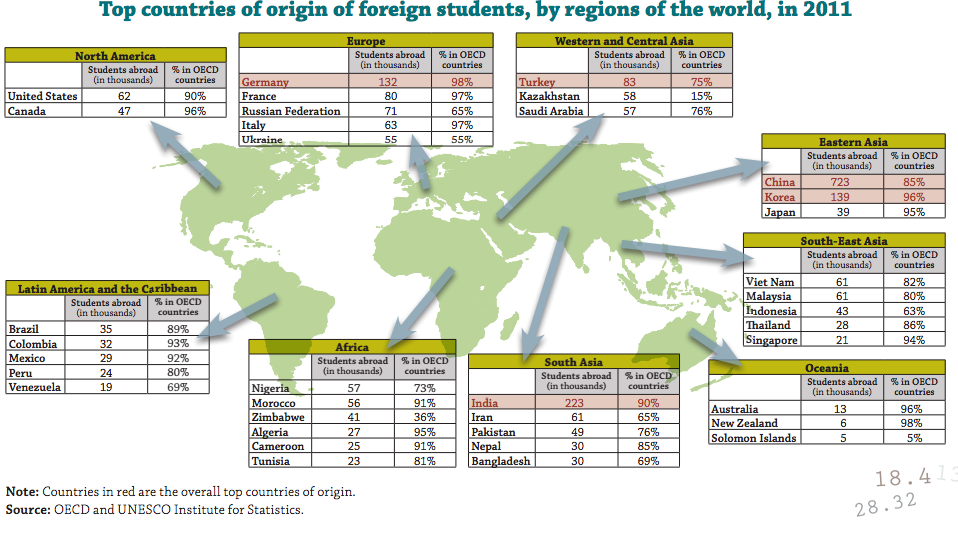PakAlumni Worldwide: The Global Social Network
Although the growth in the total number Pakistanis studying abroad has slowed since the terrorist attacks of Sept 11, 2001 in the United States, the world's sixth most populous nation continues to be among the leading sources of foreign students in America, Europe, Australia and new emerging higher education destinations in Asia.
As the number of Pakistani students in the United States has declined from a peak of 8,644 students (ranked 13th) in 2001-02 to 5,222 in 2009-10 (ranked 23rd), English-speaking OECD nations of the United Kingdom and Australia have become the biggest beneficiaries getting increasing market share of the Pakistan education market. Both nations have benefited in spite of the fact that the UK and Australian visa rejection rates for Pakistanis are higher than for students from other nations.
A recent British Council report says that 9,815 Pakistani students (Source: HESA) put Pakistan among one of the top six countries which account for 54 percent of the UK’s (non-EU) international students. Since September 2001, it has become the market leader, a place previously held by the US. In addition to Canada in North America, several Northern European countries, including Sweden and Finland, have also become quite active in marketing their education in Pakistan. As a result, these nations are attracting thousands of Pakistani students to their universities.
There is also an upward trend in Pakistani students studying in Australia. 8,458 Pakistani students studied in Australia in 2009/2010, increase of 11/4% over 2008/2009 (Source: AEI).
The US is beginning to pick up more of the Pakistani education market share after a significant decline since 911, with its simplified visa procedures and increased marketing efforts, and the excellent scholarship opportunities that they have to offer Pakistani students. Pakistan now has the world's largest Fulbright Scholarship Program with over 200 scholarships offered to Pakistani students for advanced degrees in 2011.
Beyond the traditional destinations in OECD nations, newly industrialized countries such as Thailand, Malaysia and Singapore are more visible in Pakistan and perceived as offering quality education at lower prices.
Pakistanis take education seriously. They spend more time in schools and colleges and graduate at a higher rates than their Indian counterparts in 15+ age group, according to a report on educational achievement by Harvard University researchers Robert Barro and Jong-Wha Lee.
With rising urban middle class, there is substantial and growing demand in Pakistan from students, parents and employers for private quality higher education along with a willingness and capacity to pay relatively high tuition and fees, according to the findings of Austrade, an Australian govt agency promoting trade. Private institutions are seeking affiliations with universities abroad to ensure they offer information and training that is of international standards.
Trans-national education (TNE) is a growing market in Pakistan and recent data shows evidence of over 40 such programs running successfully in affiliation with British universities at undergraduate and graduate level, according to The British Council. Overall, the UK takes about 65 per cent of the TNE market in Pakistan.
Related Links:
Pakistani Graduation Rate Higher Than India's
India and Pakistan Contrasted in 2011
Educational Attainment Dataset By Robert Barro and Jong-Wha Lee
Quality of Higher Education in India and Pakistan
Developing Pakistan's Intellectual Capital
Intellectual Wealth of Nations
Pakistan's Story After 64 Years of Independence
Pakistan Ahead of India on Key Human Development Indices
Scholarships at Foreign Universities
Institute of International Education--Open Doors


Riaz Haq
Market snapshot: International student recruitment in Pakistan - ICEF Monitor - Market intelligence for international student recruitment
https://monitor.icef.com/2024/10/market-snapshot-international-stud...
Recent data on which destinations are hosting the most Pakistani students include:
UK: 34,690 in 2022/23 (+50% y-o-y)
China: 28,000 before the pandemic
UAE: 24,865 in 2020 according to UNESCO
Australia: 23,380 in 2023 (+49%)
US: 10,165 in 2022/23 (+16%)
Germany: 8,210 in 2022/23 (+22%)
Kyrgyzstan: 6,000 in 2020 according to UNESCO
Malaysia: 5,000 in 2023
Canada: 4,750 in 2023 (+101%)
Turkey: 2,385 in 2020 according to UNESCO
Saudi Arabia, South Korea, Sweden, Qatar: At least 4,000 in 2020 according to UNESCO
(Total Pakistanis studying abroad is about 150,000)
Nov 19, 2024
Riaz Haq
What the UK International Student 2022/23 data can tell us
https://monitor.icef.com/2024/08/uk-reports-record-foreign-enrolmen...
India (173,190 students) surpassed China (154,260) as the main sender of students to UK universities. China had been the #1 market since 2018/19. Indian students represented a quarter (26%) of all international students in the UK in 2022/23.
India (+37%), Nigeria (+39%), and Pakistan (50%) were by far the fastest-growing student source countries, year-over-year.
What the 2022/23 data can tell us
India (173,190 students) surpassed China (154,260) as the main sender of students to UK universities. China had been the #1 market since 2018/19. Indian students represented a quarter (26%) of all international students in the UK in 2022/23.
India (+37%), Nigeria (+39%), and Pakistan (50%) were by far the fastest-growing student source countries, year-over-year.
The top 10 non-EU sending markets were:
India (173,190, +37%)
China (154,260, +2%)
Nigeria (72,355, +39%)
Pakistan (34,690, +50%)
US (22,540, -2%)
Hong Kong (17,095, +3%)
Bangladesh (14,945, +18%)
Malaysia (13,005, +7%)
Saudi Arabia (9,045, +3%)
UAE (8,350, +3%)
Jan 4
Riaz Haq
Pakistan rises to the third largest source of foreign students in the UK:
Top 10 markets for the UK according to study visa issuances, 2024
China:102,940
India: 88,860
Pakistan: 35,045
Nigeria: 18,900
US: 15,275
Nepal: 12,235
Bangladesh: 6,400
Malaysia: 5,420
Hong Kong: 5,180
Saudi Arabia: 4,875
https://monitor.icef.com/2025/03/uk-reduced-demand-from-india-niger...
Sure enough, visas issued to Nigerian and Indian students declined by -55% and -26%, respectively, in 2024 versus 2023. Issuances for Chinese students, by contrast, fell by only -6%.
The far gentler softening of the Chinese market saw China regain its position as the top international student source country for UK educators, reversing a two-year trend in 2022 and 2023 where India had held that spot. India is now second, with 88,860 visa issuances compared with China’s 102,940 in 2024.
Visas for Indian students fell at both the master’s and undergraduate levels. Nicholas Dillon, Director of Nous Group, commented on LinkedIn about the Indian undergraduate trend: “Interesting to see such a fall in a market for a cohort that’s not directly affected by the dependent visa changes (and interesting that it happened notwithstanding Canada’s clamp-down).” It seems clear that Indian students are considering a much wider range of options for study abroad than in the past.
Nigeria and Pakistan switch spots, and Nepali demand remains strong
The drastic -55% drop-off from Nigeria – paired with a somewhat surprising 13% increase from Pakistan – means that Pakistan is now the UK’s number three student market, with Nigeria bumped to fourth.
Pakistan’s overall surge happened even with an 85% decline in visas issued to Pakistani dependants, highlighting exceptionally strong demand from Pakistan for UK education. The dependant-to-main-applicant ratio for Pakistan had actually been slightly higher than for India before 2024 (0.37 versus 0.31, respectively) – so the dependants ban seems to have been considerably less influential on study abroad decision-making in Pakistan than in India. Visa issuances to Pakistani students increased at both the undergraduate and postgraduate level.
As with Pakistan, demand from Nepal remains strong, with 44% more visa issuances in 2024 than 2023 and growth at both the undergraduate and postgraduate levels. Nepal now represents the third largest undergraduate market for the UK and the sixth largest overall.
Mar 13